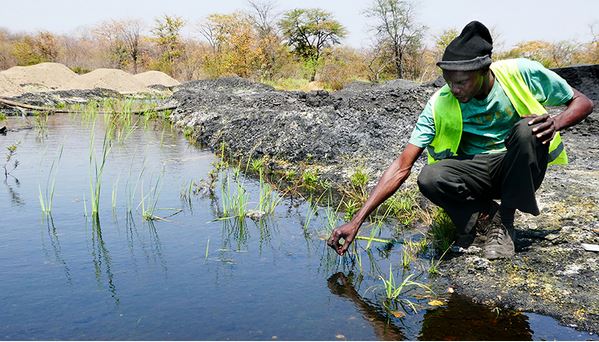Citizen Science: Knowledge as a weapon in the fight for clean water
Mining can have serious consequences for nature and the health of the population. Especially in countries of the Global South, where environmental laws are often only inconsistently implemented. In Zimbabwe, people have been fighting water pollution from coal mining for years. But they were powerless against the operators – until doctoral student Désirée Ruppen launched a citizen science project in 2018. [text is inspired by an original Eawag - Aquatic Research report]

“I had wanted to do a citizen science project for a long time to document water pollution in a mining area,” says Désirée Ruppen. “In Hwange, I came across a very committed community that made this project possible.” Ruppen and the people of Hwange were able to prove that the Deka River in the district is heavily polluted by coal mining and the coal-fired power plant, which causes a severe health risk for the people who drink its water and eat the fish in it.
Ruppen held a training session for the 13 participants from different villages about water sampling. After that, the villagers measured the water's pH value every one to two weeks at eight locations along the Deka River, resulting in 420 samples between December 2018 and March 2020. “The community-based, participatory approach has many advantages from a research perspective, particularly in the area of environmental monitoring,” says Ruppen. Usually, Swiss researchers can only stay for a few weeks in the area and collect data, which results in a limited time frame for analysis. In contrast, local residents can take samples regularly over a more extended period. This allowed Ruppen and her team to map an entire hydrological year with all its fluctuations.
In connection with the water samples, the citizens recorded weather conditions, watercolour, the presence of fish and insects, as well as companies who pumped water out of the coal mines. This background information allowed Ruppen not only to determine the water quality but to explain why changes in the river happened.
The study has provided the local people with important figures and answers, which allows them to dialogue with the government. According to Ruppen, this is one of the beautiful effects of citizen science projects. It empowers the local population, strengthens their position, and offsets power imbalances. The civil society organisation that accompanies the population in Hwange wants to file a lawsuit against the companies responsible. The data from Ruppen's study is a key pillar of their argument.
Read the whole report about Ruppen's Citizen Science project on external page eawag aquatic research!